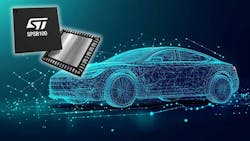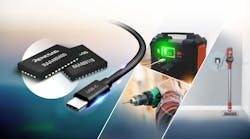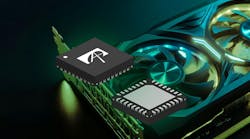Configurable Three-Output PMIC Steers Toward Automotive MCUs
A flexible power-management IC (PMIC) developed by STMicroelectronics for highly integrated processors, such as Stellar automotive microcontrollers, lets users program the power-up sequence and fine-tune output voltages and current ranges to fulfill system requirements. The SPSB100 can be used throughout vehicles, in a zonal control unit (ZCU), vehicle control platform (VCP), body-control module (BCM), and gateway modules.
The SPSB100, with three switched-mode buck converters and two linear voltage regulators (LDOs), supplies the voltage rails required for the system microcontroller and can power external peripheral loads and sensors. In addition, there are two wake-up inputs and advanced failsafe functionalities. An internal boost controller stabilizes the power during transients such as cold-cranking pulses, start/stop operation, and weak battery conditions.
All SPSB100 buck converters have overcurrent detection and current limiting for safety, with built-in soft-start to prevent excessive inrush currents. Two of the converters can deliver up to 3-A output current at a selectable output voltage of 3.3, 5, or 6.5 V. The third converter can deliver up to 6 A at 3.3, 1.25, 1.2, 1.1, or 0.98 V.
Among the LDOs, one has a fixed 5-V output capable of sourcing up to 120 mA with 2% accuracy. The second can be configured to track any of the buck converters at 3.3 or 5 V. Also, one high-side driver provides open-load and overcurrent diagnostics.
Further features include integrated non-volatile memory (NVM) for storing the output-voltage values and power-up sequence. An SPI port allows for programming and supports control and diagnostics. Documentation is available for applications that must fulfill Automotive Safety Integrity Level (ASIL) requirements in accordance with ISO 26262 for functional safety.
Although fully configurable, the PMIC is supplied in one of two pre-programmed configurations, SPSB100B or SPSB100P respectively, for directly powering the core or the internal switched-mode power supply of the microcontroller.
The SPSB100 is AEC-Q100 qualified and available now in an 8- × 8-mm VFQFN56 package, from $2.40 for orders of 1,000 pieces.
Additional resources:
Next in This Issue of PowerBites
More PowerBites
About the Author
Lee Goldberg
Contributing Editor
Lee Goldberg is a self-identified “Recovering Engineer,” Maker/Hacker, Green-Tech Maven, Aviator, Gadfly, and Geek Dad. He spent the first 18 years of his career helping design microprocessors, embedded systems, renewable energy applications, and the occasional interplanetary spacecraft. After trading his ‘scope and soldering iron for a keyboard and a second career as a tech journalist, he’s spent the next two decades at several print and online engineering publications.
Lee’s current focus is power electronics, especially the technologies involved with energy efficiency, energy management, and renewable energy. This dovetails with his coverage of sustainable technologies and various environmental and social issues within the engineering community that he began in 1996. Lee also covers 3D printers, open-source hardware, and other Maker/Hacker technologies.
Lee holds a BSEE in Electrical Engineering from Thomas Edison College, and participated in a colloquium on technology, society, and the environment at Goddard College’s Institute for Social Ecology. His book, “Green Electronics/Green Bottom Line - A Commonsense Guide To Environmentally Responsible Engineering and Management,” was published by Newnes Press.
Lee, his wife Catherine, and his daughter Anwyn currently reside in the outskirts of Princeton N.J., where they masquerade as a typical suburban family.
Lee also writes the regular PowerBites series.





